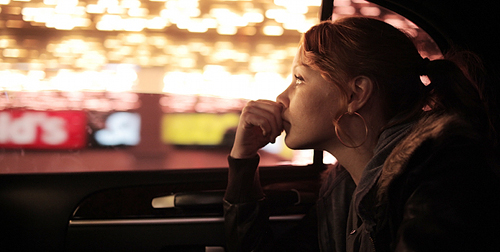Film Essent Archive for March, 2013
About Sunny: The Film Formerly Known as Think of Me
You know how sometimes you’ll see a film at a big fest, and really like it and hope it does well, and then it just seems to disappear off the radar for a while before it magically reappears? That’s the case with Bryan Wizemann’s excellent indie feature Think of Me, which I saw at Toronto waaaaaay back in 2011 and included in my 2011 wrap-up as a notable indie film of that year.
So now Think of Me finally has a VOD release, under a brand-new title, About Sunny. When I saw the film at TIFF, I wrote, in part:
As for Wizemann, he’s written a story that’s both broadly empathetic to the plight of the many, many people struggling on the brink of financial disaster to hold their lives and their families together, to take care of their kids and give them the best shot they can, and socially relevant to the moment in which we’re living. In Angela, he’s created a complex character, a mother who loves her daughter deeply and wants very much to be a good mom taking good care of her daughter, but who also makes some pretty terrible choices along the way. Yet Wizemann, with his own choices as a writer-director, refrains from judging Angela and women like her, instead choosing to simply observe her struggles and see where she goes. Smart film, smart filmmaking.
You can read my full write-up from 2011 right here. Suffice it to say, About Sunny is still a relevant film addressing one of the most pressing social issues (well, after Congressional budgetary nonsense, social security, mental health and our health care system) we’re dealing with today: How can a single parent struggling with her issues of addiction, depression and general inability to care for herself and her child make the right choices, when it’s unclear what choices there are and what the implications of each of those choices could be.
Here’s the film’s trailer:
This is the kind of smart, intimate storytelling that delves beyond so much of the same-old, same-old, “woe is me, my 20-something friends and I just can’t move past our ennui to get our shit together” indie films that we see over and over again at fests large and small. Wizemann’s film is beautifully shot, tells a complex story in a way that’s not contrived or overly complicated, and it’s anchored by a performance out of Lauren Ambrose that should have been the the one to shoot her to the top of the indie actress lists (she was nominated for the lead actress award at the Indie Spirits for her turn here). I’d love to see Ambrose get the kind of opportunities that Jennifer Lawrence saw post-Winter’s Bone … she’s really a terrific talent and I’d like to see much more from her.
Meanwhile, though, please check out Ambrose in the excellent, underseen About Sunny on VOD. You can find it on Oscilloscope On Demand or iTunes. Give it your support, y’all.











